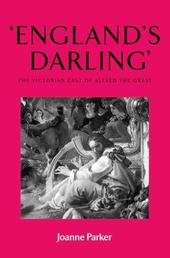
|
'England'S Darling': The Victorian Cult of Alfred the Great
Paperback / softback
Main Details
| Title |
'England'S Darling': The Victorian Cult of Alfred the Great
|
| Authors and Contributors |
By (author) Joanne Parker
|
| Physical Properties |
| Format:Paperback / softback | | Pages:264 | | Dimensions(mm): Height 234,Width 156 |
|
| Category/Genre | Art and design styles - c 1800 to c 1900
Literary studies - c 1800 to c 1900 |
|---|
| ISBN/Barcode |
9780719073571
|
| Classifications | Dewey:820.9351 |
|---|
| Audience | | Undergraduate | | Postgraduate, Research & Scholarly | |
|---|
| Illustrations |
Illustrations, black & white
|
|
Publishing Details |
| Publisher |
Manchester University Press
|
| Imprint |
Manchester University Press
|
| Publication Date |
31 May 2014 |
| Publication Country |
United Kingdom
|
Description
For much of the nineteenth century, King Alfred was as important as King Arthur in the British popular imagination. A pervasive cult of the King developed which included the erection of at least four public statues, the completion of more than twenty-five paintings, and the publication of over a hundred texts, by authors ranging from Wordsworth to minor women writers. By 1852, J.A. Froude could describe Alfred's life as 'the favourite story in English nurseries'; in 1901, a national holiday marked the thousandth anniversary of his death, organised by a committee including Edward Burne Jones, Arthur Conan Doyle and Thomas Hughes. The book examines the ways in which Alfred was rewritten by nineteenth-century authors and artists, and asks how beliefs about the Saxon king's reign and achievements related to nineteenth-century ideals about leadership, law, religion, commerce, education and the Empire. The book concludes by addressing the most interesting enigma in Alfred's reception history: why is the king no longer 'England's darling'? A fascinating study that will be enjoyed by scholars of history, cultural history, literature and art history. -- .
Author Biography
Joanne Parker is Senior Lecturer in Victorian Literature at the University of Exeter -- .
Reviews"Meticulously researched using an impressive range of materials, it represents a substantive addition to our empirical knowledge of this period." - Clare Pettitt, King's College, UK
|